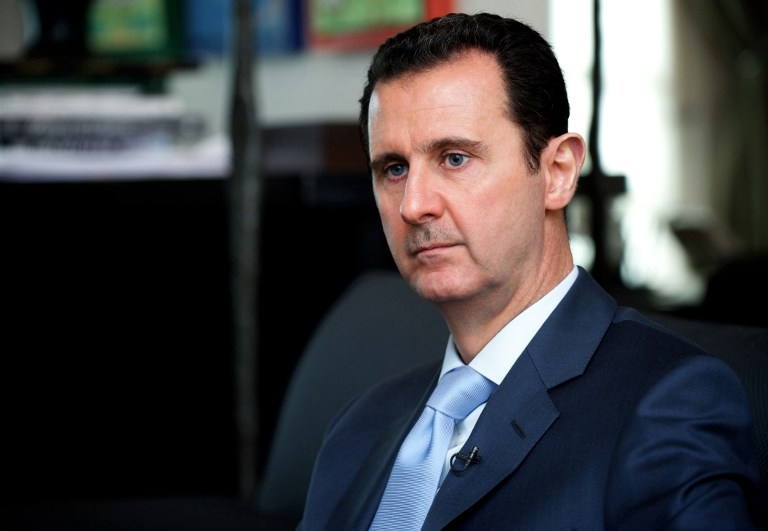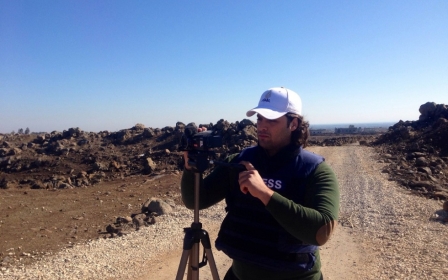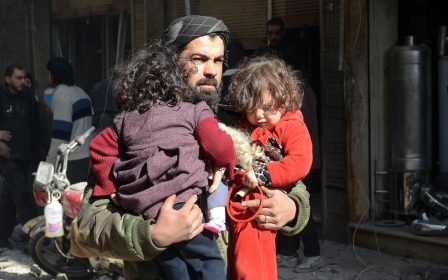Syria 'informed' about US-led strikes on IS, says Assad

Damascus receives "information" about air strikes by the US-led coalition against the Islamic State group in Syria, President Bashar Al-Assad said in an interview published on Tuesday.
"Sometimes, they convey a message, a general message," he said in an interview with the BBC in Damascus.
"There is no dialogue. There's, let's say, information, but not dialogue."
Damascus has grudgingly accepted the strikes against IS on its territory that began on 23 September last year, but has repeatedly criticised the coalition for failing to coordinate with it.
It says the raids cannot defeat IS unless the international community starts cooperating with Syrian troops on the ground.
Washington has ruled out working with Assad's government against IS, and the Syrian leader said Damascus had no interest in joining the coalition.
"No, definitely we cannot and we don't have the will and we don't want, for one simple reason - because we cannot be in an alliance with countries which support terrorism."
The comment appeared to be a reference to coalition support for other rebels groups fighting to overthrow him, all of which his government derides as "terrorists".
Assad said US officials "easily trample over international law, which is about our sovereignty now, so they don't talk to us, we don't talk to them".
Rebel fighters in Syria have reportedly complained in recent weeks that CIA funding for soldiers' wages have declined in recent months and - in some cases - ended entirely.
The US State Department responded to the concerns, saying it will continue to support Syrian rebel groups, but would not comment on CIA schemes that supply rebels with ammunitions, weapons and salaries.
Analysts told Middle East Eye that the US has cut funding from the Syrian rebels in the north after they lost terrain to al-Qaeda's Nusra Front at the end of last year and are shifting support to groups fighting the Syrian army in the south.
“The US is throwing in the towel on something that has been clearly ineffective,” added Christopher Harmer, the institute’s military analyst. “It has lost the fight in the north in terms of establishing a functional moderate rebel army and is switching resources away from that.
“The military activity on the ground is clearly at a point where we are enabling the Assad regime’s survival; and we are not coordinating with the moderate rebels in the north anywhere near as much as we should, if we think they’re a viable force.”
Assad denies 'barrel bombs'
More than 210,000 people have been killed in Syria since the conflict began with anti-government protests in March 2011.
Human rights groups accuse Damascus of indiscriminately killing civilians in air strikes on rebel-held areas, using unguided munitions such as barrel bombs.
But Assad denied that the army was using the makeshift bombs - crude barrels packed with explosives and shrapnel that are generally dropped by helicopter.
"I haven't heard of (the) army using barrels, or maybe cooking pots," he said, laughing.
"We have bombs, missiles and bullets," he added, dismissing claims that his forces were using indiscriminate weapons.
"There are no indiscriminate weapons. When you shoot, you aim, and when you shoot, when you aim, you aim at terrorists in order to protect civilians," he said.
He also denied accusations that Syria's government had used chemical weapons against its own people in August 2013, in an attack outside Damascus that killed up to 1,400 people.
"Who verified who threw that gas on who?" he said.
Asked if his government was responsible, he said "definitely not," adding that the reported death toll was "exaggerated".
He also said his forces were "definitely not" using chlorine as a weapon.
Since Syria gave up its chemical arsenal in a Russian - and US-brokered deal after the 2013 attack, there have been persistent reports of the use of chlorine gas.
In many of those instances, residents reported hearing helicopters, suggesting the involvement of government forces.
New MEE newsletter: Jerusalem Dispatch
Sign up to get the latest insights and analysis on Israel-Palestine, alongside Turkey Unpacked and other MEE newsletters
Middle East Eye delivers independent and unrivalled coverage and analysis of the Middle East, North Africa and beyond. To learn more about republishing this content and the associated fees, please fill out this form. More about MEE can be found here.




